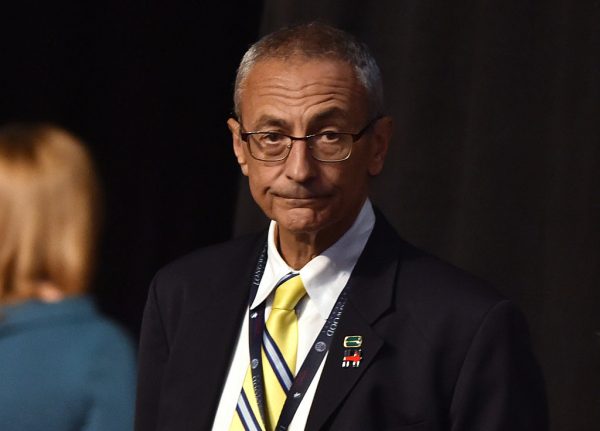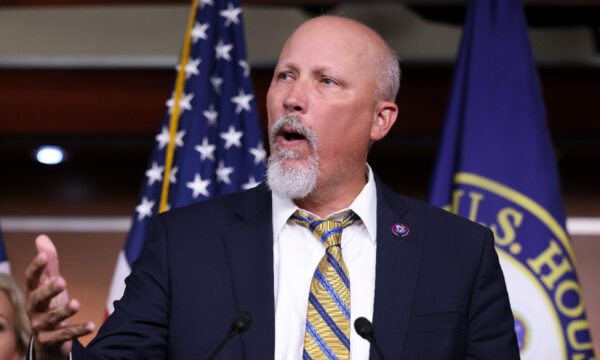ESG Advocates Say Anti-ESG Movement Creating ‘Concerns and Challenges’
It’s counterstrike time: the Republican-led movement against environmental, social and corporate governance (ESG) investing came under fire at a major environmental conference on May 30. “I don’t think there’s any chance that the anti-ESG movement will win,” said Witold Henisz, a vice dean and faculty director of the ESG Initiative at the University of Pennsylvania’s Wharton School. Yet, for now, “there is real concern and fear” in the business world about defending ESG, according to Henisz. Sustainability Week is being held by The Economist, a free-market, socially liberal publication based in London. Speakers at the three-day event include numerous Biden administration officials and other influential Democrats, alongside figures spanning the corporate world, the environmental movement, Hollywood, Silicon Valley, the Ivy League, climate philanthropy, high finance, and defense contracting. Biden adviser John Podesta, Environmental Protection Agency director Michael Regan, Sen. Jeff Merkley (D-Ore.), and White House national climate adviser Ali Zaidi are some of the high-profile participants. John Podesta, chairman of the 2016 Hillary Clinton presidential campaign, looks on before the first vice presidential debate at Longwood University in Farmville, Va., on Oct. 4, 2016. (Paul J. Richards/AFP/Getty Images) Henisz spoke about the anti-ESG push on a panel with Carol Jeppesen, of the United Nations Principles for Responsible Investment (UNPRI), and Marco Taricco, of the activist investing firm Bluebell Capital Partners. John Ferguson, global lead for “new globalization” with Economist Impact, moderated the talk. The pro-ESG professor’s comments met with broad approval from his fellow speakers. “This ESG backlash is creating some concerns and challenges, some very tangible ones,” Jeppesen said. She cited American states’ boycotts of financial institutions they believe to be undercutting oil, gas, and coal through ESG practices. The use of ESG by pension fund managers has also touched off conflict. Weeks after Biden vetoed a joint resolution intended to thwart his Labor Department ESG investing rule, Rep. Chip Roy (R-Texas) and other Republicans introduced legislation to keep federal money out of any ESG-influenced retirement funds. Rep. Chip Roy (R-Texas) speaks at a press conference about the National Defense Authorization Bill at the U.S. Capitol in Washington on Sept. 22, 2021. (Kevin Dietsch/Getty Images) Although some ESG critics have put their money where their mouths are by developing counter-ESG investing strategies, Jeppesen argued that ongoing anti-ESG efforts in many states “can only lead to suboptimal returns in portfolios and additional costs when they’re issuing debt.” “It’s really the opposite, if you will, of the free market economy,” the UNPRI representative said. “In practice, irrespective of what some of the politicians attacking ESG are saying, the train has really left the station, and investors increasingly are understanding the material significance of issues like climate transition to their investment portfolios, and really to the overall economy at a systemic level as well,” she added. Henisz described an example of what he called “greenhushing”—that is, companies’ attempts to cover up their actions on climate and related areas: BlackRock’s Larry Fink pushed back the release of his annual letter. The professor complained that the timing meant those at the World Economic Forum’s January meeting in Davos couldn’t read the message while gathered in the Swiss ski resort town. The main entrance of the congress center where the World Economic Forum will take place later this week in Davos, Switzerland. (Michel Euler/AP Photo) Yet, he and Taricco voiced frustration with the offerings from BlackRock that are labeled ESG. “There’s very little in the way of ESG tilt, and as a result, they don’t really deliver strong ESG performance or notable financial performance,” Henisz said, adding that “more sophisticated” products from that company’s competitors were losing out. “The largest driver of inflows is the size of your fund family, giving BlackRock a huge advantage, and the financial returns that your funds generate relative to their benchmark. That’s a problem. We need to call more attention to that,” he said. “The money we manage is not our own—it belongs to our clients, many of whom make their own asset allocation and portfolio construction decisions. “For clients interested in incorporating sustainability strategies into their portfolios, we offer solutions across public and private markets, including broad index funds, active strategies, impact funds and more.”

It’s counterstrike time: the Republican-led movement against environmental, social and corporate governance (ESG) investing came under fire at a major environmental conference on May 30.
“I don’t think there’s any chance that the anti-ESG movement will win,” said Witold Henisz, a vice dean and faculty director of the ESG Initiative at the University of Pennsylvania’s Wharton School.
Yet, for now, “there is real concern and fear” in the business world about defending ESG, according to Henisz.
Sustainability Week is being held by The Economist, a free-market, socially liberal publication based in London.
Speakers at the three-day event include numerous Biden administration officials and other influential Democrats, alongside figures spanning the corporate world, the environmental movement, Hollywood, Silicon Valley, the Ivy League, climate philanthropy, high finance, and defense contracting.
Biden adviser John Podesta, Environmental Protection Agency director Michael Regan, Sen. Jeff Merkley (D-Ore.), and White House national climate adviser Ali Zaidi are some of the high-profile participants.

Henisz spoke about the anti-ESG push on a panel with Carol Jeppesen, of the United Nations Principles for Responsible Investment (UNPRI), and Marco Taricco, of the activist investing firm Bluebell Capital Partners.
John Ferguson, global lead for “new globalization” with Economist Impact, moderated the talk.
The pro-ESG professor’s comments met with broad approval from his fellow speakers.
“This ESG backlash is creating some concerns and challenges, some very tangible ones,” Jeppesen said.
She cited American states’ boycotts of financial institutions they believe to be undercutting oil, gas, and coal through ESG practices.
The use of ESG by pension fund managers has also touched off conflict.
Weeks after Biden vetoed a joint resolution intended to thwart his Labor Department ESG investing rule, Rep. Chip Roy (R-Texas) and other Republicans introduced legislation to keep federal money out of any ESG-influenced retirement funds.

Although some ESG critics have put their money where their mouths are by developing counter-ESG investing strategies, Jeppesen argued that ongoing anti-ESG efforts in many states “can only lead to suboptimal returns in portfolios and additional costs when they’re issuing debt.”
“It’s really the opposite, if you will, of the free market economy,” the UNPRI representative said.
“In practice, irrespective of what some of the politicians attacking ESG are saying, the train has really left the station, and investors increasingly are understanding the material significance of issues like climate transition to their investment portfolios, and really to the overall economy at a systemic level as well,” she added.
Henisz described an example of what he called “greenhushing”—that is, companies’ attempts to cover up their actions on climate and related areas: BlackRock’s Larry Fink pushed back the release of his annual letter.
The professor complained that the timing meant those at the World Economic Forum’s January meeting in Davos couldn’t read the message while gathered in the Swiss ski resort town.

Yet, he and Taricco voiced frustration with the offerings from BlackRock that are labeled ESG.
“There’s very little in the way of ESG tilt, and as a result, they don’t really deliver strong ESG performance or notable financial performance,” Henisz said, adding that “more sophisticated” products from that company’s competitors were losing out.
“The largest driver of inflows is the size of your fund family, giving BlackRock a huge advantage, and the financial returns that your funds generate relative to their benchmark. That’s a problem. We need to call more attention to that,” he said.
“The money we manage is not our own—it belongs to our clients, many of whom make their own asset allocation and portfolio construction decisions.
“For clients interested in incorporating sustainability strategies into their portfolios, we offer solutions across public and private markets, including broad index funds, active strategies, impact funds and more.”












